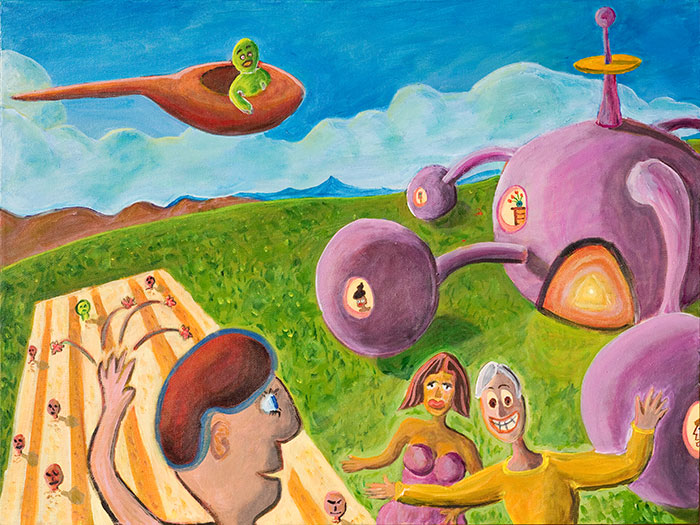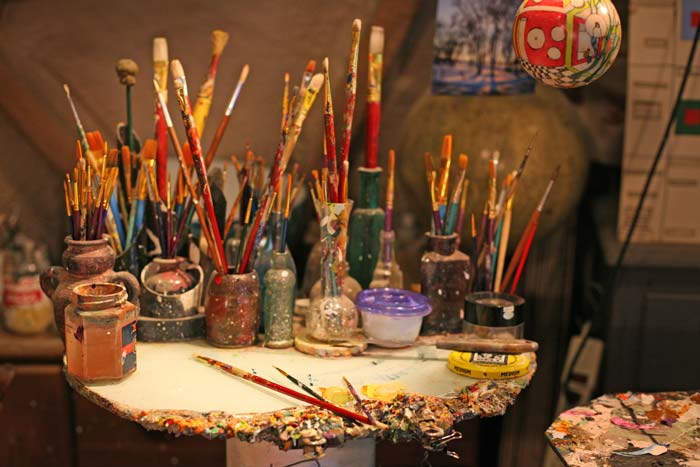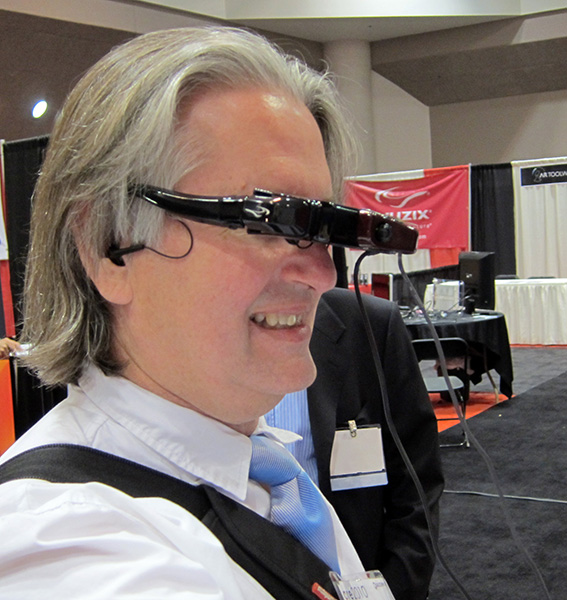
The Paranoid Critical Method
by Bruce Sterling

“My fabulous story should be told, and retold, in every lurid detail,” said the Spanish boy. “I should be renowned for generations as the supreme artistic genius of the twenty-first century.”
“Did you eat this morning?” asked the Russian woman. “Because you are babbling like a lunatic.”
“I was too nervous to eat! I was too excited! We’ve come so far! My life will change forever, today, here, in Milan!”
The Russian woman gave the teenager her bright, black stare. She had tight, braided hair and a glare that could pierce a brick wall. “I told you to eat! You know how you behave when you don’t eat! Now what am I to do with you?”
The teenager adjusted his thick plastic spectacles. “I don’t like Italian bread, darling! The harsh crust of Italian bread reminds me of my mother’s death! I did eat the fried bacon. I ate one very, very small piece of fried bacon....”
The Russian woman pulled the Spanish boy out of the flow of the Milanese crowd. “These art crowds are always so big at the palazzo,” she grumbled. “We’ll go the Galleria instead. You will not see the grand master’s great paintings. Not yet. Not until you eat something.”
“Can we afford to go to the Galleria?” said the Spanish teen, limping along behind her. “Can we afford some nice Italian shoes?”
The Russian woman tucked her clean, white, delicate hands into her woolen sleeves. “Never let them know that we are poor!” she said. “We are rich in spirit! We will dine with French presidents. We will lunch with American bankers. I am a trusted intimate of the greatest art critic in the world!”
The couple emerged from a portico onto the vast stony plane of the Duomo. The boy had never seen the greatest church in Milan. He had never been outside Spain. He stared at the towering facade, completely transfixed.
The Russian woman took the opportunity to buy a hot dog from a street vendor. She fetched two Coca Colas.
She slipped the still-warm hot dog into the boy’s slack hands. He munched absently as he stared through his glasses at the intricate, towering marble.
“What are our archetypes,” he muttered, “in all their artificial and affected glory, if not our very delusions?”
“Stop talking like a professor,” she said, linking her solid arm in his narrow arm.
“The professors at my art school were never fit to judge me!” screeched the Spaniard. “All colleges of art are in sick decay! They should be violently overthrown in a revolution of augmented reality!”
The Russian woman sipped companionably at the icy slush of her Coca-Cola. “Can you take those weird glasses off your face?” she asked. “Just for one minute?”
“Never! I refuse to do it!” said the boy. “My augmented reality is the very symbol of my modernity! I can see the church, and the clouds. I can see the cloudiness of the marble, and the stoniness of the clouds! I could draw all of this.”
“You wouldn’t be the first artist to draw the Duomo,” sniffed the Russian woman. A smiling gypsy sidled up with a tray of plastic-wrapped roses. The Russian woman aimed a swift kick at his shins. Scowling, the gypsy sidled off.
“I would be the first artist,” said the boy, “to draw this church, and that sky, in the way I can draw. In the way that I can see.”
“What do you see?” she asked him.
“I can see,” he told her, “that those innocent, fluffy, white clouds are full of paranoid menace.”
“That is very insightful, my dear,” nodded the Russian woman. “Our innocent clouds truly are full of menace.”
“It is? They are?”
“Oh yes, the modern clouds are most definitely full of menace. You can ask any climate scientist. Ask any serious modern thinker. You can ask my dear friend the French art critic. He knows all about the unacknowledged terrors deep within conventional society.”
“Can your friend the art critic tell me why the Church is full of paranoid menace?”
“Oh yes. Absolutely! I’m certain that he can do that. He does that all the time.”
The Spanish boy clamped his narrow hands to the sides of his head. “But a church is a sacred place of goodness and holiness! My faith should be the crutch for all my traumas! What must I do to be saved? Keep in mind that I don’t believe in God. Yes, I see God all the time... but I never believe.”
The Russian woman sighed. “I can save you.”
“Can you? Really? In reality?”
“Yes, I can save you in reality. That will be a lot of trouble for me. I’ve saved other men like you. Most were not so young as you, and most of them not so bright, and not so badly off.... But... look. Listen to me. I like the kind of man who just ‘needs what a man needs from a woman.’ Because I can give men that. I’m great at it. It takes me half an hour. You’re not that kind of man. Not at all. Saving you would cost me my whole life.”
“Oh, great! Will you marry me, then? I’d be so happy!”

“I’m already married,” groaned the Russian woman. “I’m married to a great poet. I met him when we were both dying in a hospital. We cured each other with love. I crossed a war-zone to marry that man. We have a child. My husband is a nice guy. He still loves me. I’m in his poems.”
“But I’m a great poet, too! And I can paint! And I can take photographs! I can make furniture, even. Lithographs, perfumes —I can do anything! I’m a creative immortal.”
“You are not immortal. You are nineteen, and I’m thirty-one. You will outlive me, though. You will put me in my grave. I know that. You’ll draw my grave and put me inside it.” The Russian woman shrugged in irritation. “That’s for sure.”
“So, save me! Do that! I’ll spit on my mother’s grave if I have to, I’ll starve under a bridge—nothing scares me! Just don’t let me be mediocre! Any fate but mediocrity!”
In his trembling agitation, the boy dropped his half-eaten hot dog. The Russian woman stooped swiftly and picked it from the stony Milanese paving.
“Don’t eat that,” said the boy.
“Oh, it’s not dirty! You think that everything is dirty. Nothing is dirty. Don’t be so bourgeois.”
The boy gave the hot dog one swift glance. “It has an ant on it.”
The Russian woman gazed at the hot dog. It indeed had one tiny black ant, floundering in agony on its mayonnaise-stained surface. An ant as small as a speck of pepper. Its death struggle was titanic.
“There are no ants in Milan,” she said, swiftly taking a bite. “You’re imagining things.”
“That ant was already a corrupting presence inside the hot-dog stand,” said the Spanish boy, adjusting his thick glasses. “That ant is just like an elephant. That ant is a colossal armored knight of pestilential corruption.”
“Well, that’s true,” said the woman. “You have sensed the truth about the ants. I admit it. I lied to you just to make you feel better. The truth is, the ants are older than mankind. The ants outnumber us. When we perish, the ants of the earth will eat our flesh.” She ate the ant.
“You are even braver than me,” the boy said sadly.
“I’m not an artist,” the woman said.
“You are a muse! You are a tigress, a martyr, a mistress, a mother and a banker! Maybe you are a goddess.”
The Russian woman licked mayonnaise from her sharp, painted nails. “I’m a goddess?”
“I can portray you as a goddess! Because I can see you as a goddess. You’ll be the sexiest, sweetest, sagging middle-aged woman who was ever painted by a great artist. You’ll live forever!”
The woman thought about this proposition. “Give me your wallet,” she said.
The boy reached into his dust-stained trousers. “There’s nothing inside my wallet,” he said, handing it over.
“I know that,” she said, slipping it into her tattered purse. “But at least this is a start. Listen to me, world’s greatest artist: I want a house.”
“I love the idea of our house! One tiny fisherman’s shack on the coast of Spain. So snug! No room for any strangers! Just you and me, forever.”
“I want my own house. Because I never had a house. I want a castle. I want a castle in Spain. With a butler. With maids and a cook. And you never show up there unless I send you a written invitation.”
“All right,” said the boy, waving both his arms. “I promise, I will give you a castle in Spain! I can see a castle in those clouds!”
“I believe you,” she said. “I truly believe that you will some day be the greatest artist in the world. This is how it will happen. First, I will choose to believe it. Then I will make you believe it. And when we both believe it, the force of our divine love will be so overwhelming that everyone will believe it. They won’t ever understand it... but they will believe it. You will have all the charismatic power of a dictatorial maniac, without the ugly nuisance of being insane. Because, as the great William Burroughs once wisely said, ‘the hallucinatory operators are real.’“
“Who is this William Burroughs? Was he a great painter, like me?”
“You are very young,” she said, “and you badly need a sentimental education.”
“I have no fear of real hallucinations,” said the Spanish boy, pulling off his glasses. His eyes were pale and the untanned skin around his black eyebrows was paler yet. “Let me master real hallucinations, and I will become very famous.”
“You won’t enjoy that fame. Because you’re very bad with people. I’ll have to come with you... I’ll have to take care of you… I can teach you how to be famous. Fame is all a charade. It’s an act.”
“Well, at least I’ll be rich.”
“Oh, you never know what to do with money! You have no idea what money is! You’re a rich boy and your father was a stodgy right-wing lawyer... Let me take care of the money issue. It’s all right.”
“We’ll have our children. The golden children of our divine love!”
“No children! They’re larvae! They are naked embryos. We hate children. I hate my own child by that poet. Children are such a nuisance when your life is immortal fame.”
“We’ll have our true love, though. We will never betray each other.”
“I’m not quite sure how to tell you about this part,” sighed the Russian woman, “but I can have... well... any man who catches my eye. I don’t intend to change that. I’ve always been that way. That’s who I am.”
The boy giggled at this. Then he laughed aloud. He cackled and he crowed. He went on at it for quite a while. Long enough that people began to stare.
“Darling, will I ever, ever be safe and happy?”
“No. Never, no. But you will shatter every limit between yourself and your perceptions. You will hurt reality so much that people won’t believe the real is really real.”
The boy thought this over. He believed her.
“I have to believe it’s worth it,” he said at last. “I know that other people have done it.... It must be worth it! Let’s go and see the classics right away!”
About the Author

Bruce Sterling is a well-known futurist, science-fiction writer, and blogger. This story was commissioned for a major Salvador Dali retrospective at the Palazzo Reale in Milan, which takes place September 22 - January 30, 2011. And, yes, Dali's wife Gala was an older Russian woman. You can follow Bruce minute by minute as bruces on Twitter.
Post a comment on this story!